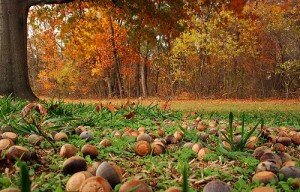by Ragan Sutterfield
[Ed. note: This article is part of our series of weekly reflections, called Deep Down Things, published on Wednesdays.]

Great thankfulness from little acorns grows. (cc image courtesy douglas.earl via flickr)
Last night I took a walk and for most of the time my footsteps were accompanied by the sound of cracking. Acorns were everywhere, their yellow flesh spilt across the path, trampled by feet upon feet. The wild animals that eat them simply couldn’t keep up. The people who could eat them never stopped to pick them up.
Acorns are a common sign of fall for those of us who live in the oak-forested, deciduous woodlands. As much as pumpkins on porch steps, acorns are a warning that the season is changing, a new time is beginning. But acorns are also a sign not only of the season but what the season holds—harvest.
We tend to think of harvest as a time when we reap what we sow, when the hard work of summer is paid, when the money invested in feed and fertilizer and long hours on a tractor are paid off with a silo full of grain. And while all of these have their part in the concept of harvest, the coming of acorns disciplines our understanding in an important way.
Acorns, a free and easily available form of good proteins and fats that can be turned into a bread, were a regular part of the diet of native peoples. But as we have come to rely more and more on the products of agriculture rather than the freely available food of the creation, most of us have ceased to take advantage of the bounty of fall. This is a mistake.
It is important that we learn to accept the gifts that come to us, and by taking acorns and using them, we participate in the bounty of creation that God has provided us. Acorns discipline our understanding of harvest so that we come to understand that all that we gather, whether we had a role in planting it or not, is ultimately a gift. We may work hard in a garden, but most of what really makes a garden possible—the soil organisms that deliver nutrients to plants, the organic matter that feeds and protects the roots, the rain that provides water, the genetics that provided the base for our cultivated varieties—were all gifts that we received rather than created. Gathering acorns protects us from imagining that the sustaining of our lives depends on us.
Acorns, being gifts, also help us understand that there is a flip side to the gift of harvest—theft. Sometimes, what is reaped in the

"I will praise God's name in song and glorify him with thanksgiving." -Psalm 69:30 (cc image courtesy Kate Ware via flickr)
fall is not the gathering of gifts but rather the embezzlement of creation. When we destroy the soil with chemical fertilizers, compact the land with heavy machinery, pollute the rivers with nitrogen from both fertilizers and feedlots, we are stealing and abusing the gifts that God freely offers us. Rather than being content with the abundance provided, we follow the path of folly warned of frequently in Scripture—of gathering more than we need and pretending it belongs to us because of the small amount of work we contributed to its possibility.
By gathering acorns, from trees we neither planted nor cared for, our understanding of harvest evolves into a reception of gifts. This is an understanding that is essential for the practice of thanksgiving and ultimately for the welcoming of Christ that comes in the seasons of Advent and Christmas.
So this fall, go for a walk and see what you can gather. Make a meal. Give thanks. Thank God for the gifts of creation, pray for forgiveness for your theft, and praise God that so little depends on you.
Ragan Sutterfield writes, gardens, and gathers in Little Rock, Arkansas. He is the author of Farming as a Spiritual Discipline.
Inspired by Sam Gribley (of “My Side of the Mountain”), my boys took the time to gather acorns this year, crush them, soak them, then roasted and ground them as a coffee substitute for me. They were so very proud of their knowledge and skill. Great post on the abundance of God in creation. Thanks, Ragan!
Thanks for your comment, David. “My Side of the Mountain” was one of my favorites growing up. Thank you for reminding me of this wonderful book!